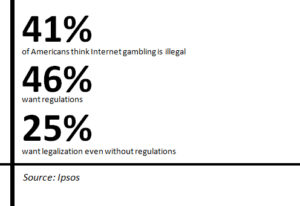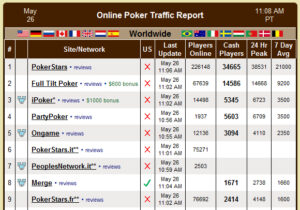It’s been a crazy six weeks for online poker as we’ve watched the U.S. government deliver blow after blow to our industry.
Here at CAP, just as at many other sites, we’ve analyzed the situation and tried to figure out what the future holds. But what to the casual players themselves think? Do they realize what’s going on?
One month after Black Friday, an Ipsos poll showed that “only 41% of Americans believe that Internet gambling is illegal.
The report added that, when educated about the status of online gaming, “46% would be willing to see it permitted as long as appropriate government regulations were in place, with as many 25% willing to permit it even without government regulations.”
The report continues: 9% of Americans currently “admit to spending some money on internet gambling activities in the past year” and, should it be regulated, 13 to 15% said they’d “probably or definitely” spend money on Internet gambling during the next year. 
The poll goes so far as to ask people who should do the regulating, too: 55% wanted state regulations, 45% wanted federal laws. Last year, those numbers were reversed, with 45% favoring states and 55% federal regulations.
Running the blockade
Given the fact that most of the public are basically clueless about the legal status of online poker, it’s not surprising to hear that some players are also disregarding the government’s blockade.
The targeted sites have lost many players — but not all, some reports are showing. Although Absolute Poker is struggling for life with the loss of U.S. players, “PokerStars and Full Tilt are still so big, players know they can get the game of their choice at the stakes they want at any time,” PokerScout’s Dan Stewart told Bloomberg. 
Stewart is in big demand from the media these days. He also recently explained to the Las Vegas Review Journal how some Americans are still playing for real money on Absolute Poker, despite the shutdown.
Stewart explained that some players who had downloaded Absolute Poker’s software before April 15 “can sidestep federal law enforcement” and points to data showing people doing just that, in Chicago, Cincinnati, Colorado, California, and Minnesota.
Whether this is a technical error, a flouting of U.S. authorities, or simply part of the “grace period” that U.S. lawmakers agreed to is the matter of some debate. And this loophole may be closed soon — maybe by the time you read this.
Playas gon’ play
But there’s still a lesson here. This kind of legal sidestepping is not to be recommended, but it’s also clear that the players are not really trying to break the law. They just want to play poker.
“It’s not illegal to play online poker, so as long as players are doing nothing wrong, people outside the country will give them that opportunity,” Randall Fine, a gaming management executive, told Fox Business. “It’s like whack a mole, you can knock a few down, but a few more will pop up.”
So why not start offering regulated online gaming sites? Giving players another, safer, more thoroughly legal option at this point could also bring in much-needed revenue. Or would that make too much sense?